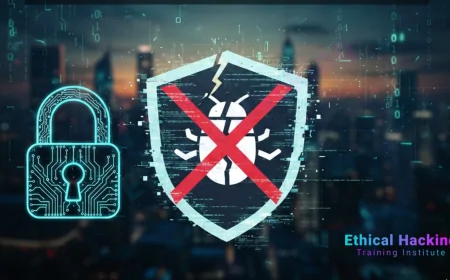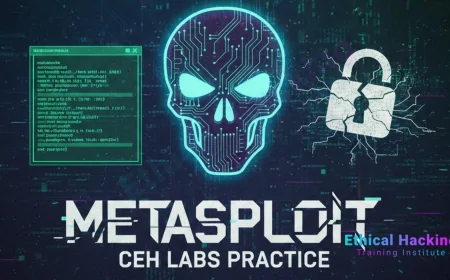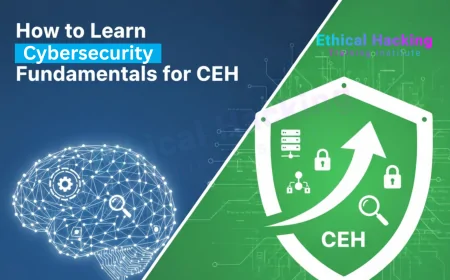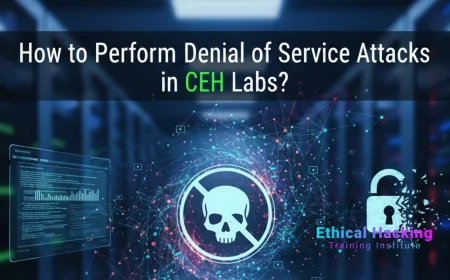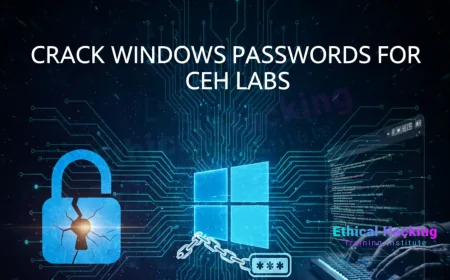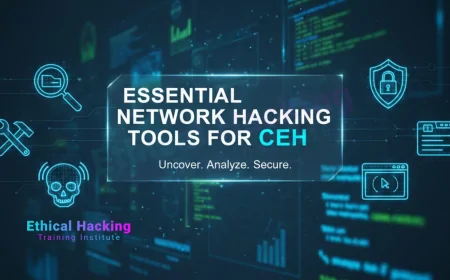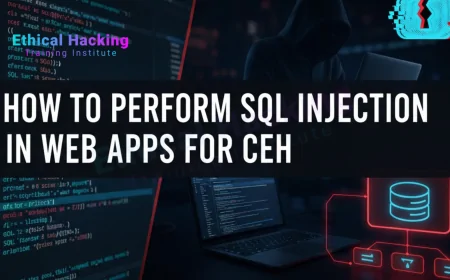Eligibility Criteria for Ethical Hacking Courses in Pune | A Complete Guide for 2025
Discover the complete eligibility criteria for ethical hacking courses in Pune. Learn who can enroll, technical prerequisites, ideal backgrounds, and how to kickstart your cyber security career in 2025 with hands-on training.
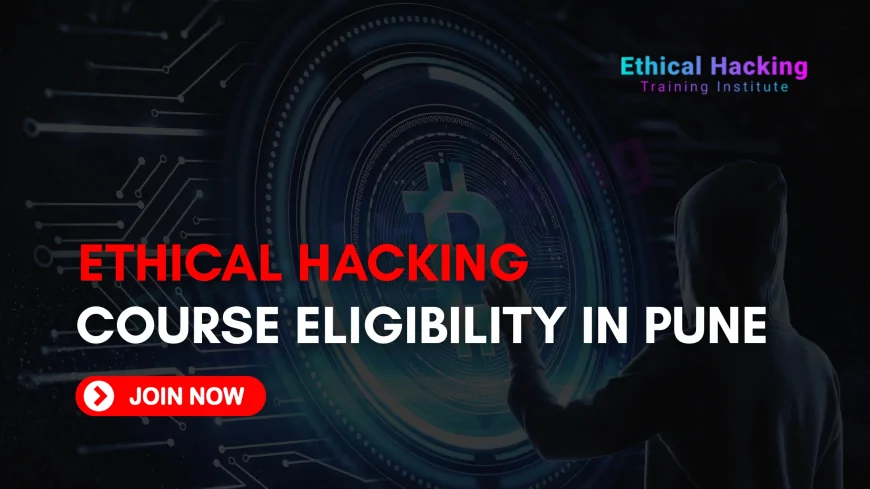
Embarking on a career in ethical hacking requires a clear understanding of the eligibility criteria, especially for those considering courses in Pune. This guide delves into the various prerequisites and considerations for enrolling in ethical hacking programs, ensuring you are well-prepared to take the next step in your cybersecurity journey.
1. Educational Background
Minimum Educational Qualifications
While many ethical hacking courses in Pune are open to a broad audience, having a foundational education in computer science or related fields can be beneficial. Some programs may require at least a high school diploma or equivalent, while others might prefer candidates with a bachelor's degree in IT, computer science, or engineering.
Relevance of Academic Background
A background in information technology, networking, or computer science provides a solid foundation for understanding the complex concepts taught in ethical hacking courses. However, individuals from other disciplines with a keen interest in cybersecurity can also pursue these courses, provided they are willing to invest time in learning the basics.
2. Technical Skills and Knowledge
Basic Computer Proficiency
A fundamental understanding of computer operations, operating systems, and internet usage is essential. Familiarity with command-line interfaces and basic software applications will aid in grasping more advanced topics.
Understanding of Networking Concepts
Knowledge of networking principles, including IP addressing, subnetting, and protocols like TCP/IP, is crucial. This understanding helps in comprehending how data travels across networks and how vulnerabilities can be exploited or mitigated.
Programming Knowledge
While not always mandatory, familiarity with programming languages such as Python, Java, or C++ can be advantageous. Programming skills enable ethical hackers to write scripts, automate tasks, and understand the logic behind various applications.
3. Certifications and Prior Training
Preliminary Certifications
Holding certifications like CompTIA Security+ or Cisco's CCNA can provide a competitive edge. These certifications demonstrate a foundational understanding of security principles and networking, which are integral to ethical hacking.
Hands-On Experience
Practical experience, such as internships or personal projects related to cybersecurity, can enhance your learning experience. Engaging in activities like setting up home labs or participating in online hacking challenges can provide valuable insights.
4. Personal Attributes and Soft Skills
Analytical Thinking
Ethical hacking requires the ability to analyze systems critically, identify potential vulnerabilities, and devise solutions. Strong analytical skills are essential for success in this field.
Problem-Solving Abilities
The dynamic nature of cybersecurity threats necessitates quick thinking and effective problem-solving skills. Ethical hackers must be adept at developing innovative solutions to complex security issues.
Ethical Judgment
A strong moral compass and understanding of legal boundaries are paramount. Ethical hackers must ensure their actions are within legal frameworks and aimed at improving security, not exploiting it.
5. Language and Communication Skills
Proficiency in English
Most ethical hacking courses and resources are available in English. A good command of the language facilitates better understanding of course materials and effective communication within the cybersecurity community.
Report Writing and Documentation
Ethical hackers often need to document their findings and communicate them to stakeholders. Strong writing skills are essential for creating clear and concise reports.
6. Age and Legal Considerations
Minimum Age Requirements
Some courses may have age restrictions, typically requiring participants to be at least 18 years old. This ensures that students have the maturity to handle sensitive information responsibly.
Legal Compliance
Understanding and adhering to legal standards is critical. Ethical hackers must be aware of laws related to cybersecurity and ensure their activities comply with legal and ethical guidelines.
7. Course-Specific Requirements
Prerequisites for Advanced Courses
Advanced ethical hacking courses may require prior knowledge or experience in cybersecurity. Before enrolling, ensure you meet any specified prerequisites to maximize the benefits of the program.
Technical Equipment
Access to a computer with specific hardware or software configurations may be necessary for certain courses. Ensure you have the required technical setup to participate fully in practical exercises.
8. Financial Considerations
Course Fees
Ethical hacking courses in Pune vary in cost. It's important to assess the value offered by the course relative to its price, considering factors like curriculum depth, hands-on experience, and certification.
Additional Expenses
Beyond tuition, consider costs for study materials, certification exams, and any necessary software or hardware. Budgeting for these expenses ensures a smooth learning experience.
9. Time Commitment and Flexibility
Course Duration
Courses can range from a few weeks to several months. Evaluate your availability and choose a program that fits your schedule, whether it's a full-time intensive course or a part-time evening class.
Self-Study Requirements
Success in ethical hacking often requires additional self-study. Be prepared to dedicate time outside of scheduled classes to practice skills and deepen your understanding.
10. Career Aspirations and Goals
Alignment with Career Objectives
Consider how the course aligns with your long-term career goals. Whether you're aiming for a role in penetration testing, security analysis, or cybersecurity consulting, ensure the course content supports your aspirations.
Certification and Recognition
Opt for courses that offer recognized certifications, as these can enhance your employability and credibility in the field. Certifications like CEH (Certified Ethical Hacker) are widely acknowledged in the industry.
FAQ's
1. Who is eligible for ethical hacking courses in Pune?
Anyone with a basic understanding of computers and internet technologies can enroll. While most courses welcome beginners, having a background in IT or networking is advantageous. Institutes in Pune often tailor content to suit both novices and intermediate learners.
2. Is a degree in computer science necessary to join an ethical hacking course?
No, a degree in computer science is not mandatory. Many ethical hacking training programs in Pune accept candidates from varied educational backgrounds, as long as they demonstrate interest and basic technical aptitude.
3. Can I join an ethical hacking course after 12th grade?
Yes, many ethical hacking courses in Pune are open to students who have completed 12th grade. Some foundational knowledge in computers or science is helpful but not required, especially for beginner-level certifications.
4. Do I need to know programming before enrolling?
While programming knowledge (e.g., Python, C++) is beneficial, it is not always required. Many institutes offer beginner-friendly courses that start from the basics, gradually introducing coding as part of the curriculum.
5. Are working professionals eligible for ethical hacking training in Pune?
Yes, ethical hacking courses in Pune cater to working professionals. Flexible batch timings, online options, and weekend sessions make it convenient to upskill without interrupting your job.
6. What is the minimum age to join an ethical hacking course?
Typically, the minimum age is 18 years, although some courses may accept younger learners with parental consent. Most institutes prioritize maturity, responsibility, and genuine interest in cybersecurity.
7. Do I need prior cybersecurity knowledge?
Prior knowledge is helpful but not mandatory. Most beginner courses cover foundational cybersecurity topics before diving into ethical hacking. Institutes in Pune often include preparatory modules to bridge any gaps.
8. Is ethical hacking training suitable for non-IT students?
Yes, non-IT students with a passion for technology and problem-solving can pursue ethical hacking. Many courses start with networking and system fundamentals to accommodate such learners.
9. Are there any exams I must pass before enrolling?
No mandatory entrance exams are required for most ethical hacking courses in Pune. However, some advanced programs may assess your technical knowledge through short quizzes or interviews.
10. Do ethical hacking courses have any physical fitness or background check requirements?
No physical fitness criteria exist. However, a clean legal record is essential, as ethical hackers often work with sensitive data and systems, requiring a trustworthy background.
11. Can school students learn ethical hacking?
Yes, some institutes in Pune offer introductory workshops or summer training for school students interested in ethical hacking. These programs focus on building awareness rather than professional skills.
12. Is fluency in English necessary?
English is generally the medium of instruction, so basic fluency is necessary to understand course material, tools, and documentation. Communication skills are also crucial for report writing and presentations.
13. What kind of computer or laptop is needed for the course?
A computer with at least 8GB RAM, a modern processor, and internet access is recommended. Many courses use virtual labs or hacking simulators that require a decent computing environment.
14. Can I take an ethical hacking course online from Pune?
Yes, many training providers in Pune offer online ethical hacking courses, complete with virtual labs, live mentoring, and recorded sessions for flexible learning.
15. Are there any legal eligibility conditions for learning ethical hacking?
Yes, learners must agree to follow ethical guidelines and cybersecurity laws. Training institutes emphasize legality, and participants are often required to sign a code of conduct.
16. Do I need to clear any certifications before starting ethical hacking?
No prior certification is needed for beginner-level ethical hacking courses. However, holding certifications like CompTIA A+ or Network+ can give you a head start.
17. Are there short-term courses available for eligibility testing?
Yes, institutes in Pune often offer short-term bootcamps or workshops that allow you to test your interest and aptitude before committing to a full-fledged ethical hacking program.
18. Is mathematics a requirement for ethical hacking courses?
Advanced math isn't essential, but logical reasoning and basic arithmetic skills help in problem-solving, cryptography, and analytics within ethical hacking modules.
19. Are there specific eligibility criteria for CEH (Certified Ethical Hacker) training in Pune?
Yes, CEH training typically requires basic knowledge of networking and systems. Some institutes may recommend prior cybersecurity exposure, but beginners can start with foundational courses before progressing to CEH.
20. How can I evaluate if I’m ready for an ethical hacking course?
Assess your interest in cybersecurity, comfort with computers, and ability to learn technical subjects. If you're curious about how systems work and how to secure them, you're a good fit for ethical hacking training.
Your Cybersecurity Journey Begins Here
Pursuing an ethical hacking course in Pune is a strategic step towards a rewarding career in cybersecurity. By understanding and meeting the eligibility criteria, you position yourself for success in this dynamic and essential field. Assess your current skills, align your goals, and choose a course that best fits your aspirations and lifestyle.
What's Your Reaction?
 Like
0
Like
0
 Dislike
0
Dislike
0
 Love
0
Love
0
 Funny
0
Funny
0
 Angry
0
Angry
0
 Sad
0
Sad
0
 Wow
0
Wow
0
